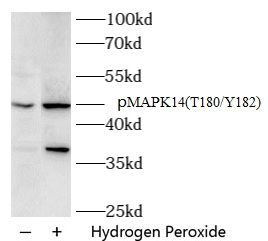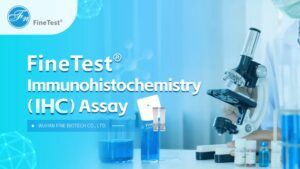Products
Phospho-MAPK14 (T180/Y182) antibody
Category:
Research Area:
| Synonyms: | CSBP antibody, CSBP1 antibody, CSBP2 antibody, CSPB1 antibody, EXIP antibody, Mxi2 antibody, PRKM14 antibody, PRKM15 antibody, RK antibody, SAPK2A antibody, p38 antibody, p38ALPHA antibody | ||
| Catalogue No.: | FNab10117 | Reactivity: | Human |
| Host: | Rabbit | Tested Application: | ELISA, WB |
| Clonality: | polyclonal | Isotype: | IgG |
- SPECIFICATIONS
- Product Name
- Phospho-MAPK14 (T180/Y182) antibody
- Catalogue No.
- FNab10117
- Size
- 100μg
- Form
- liquid
- Purification
- Immunogen affinity purified
- Purity
- ≥95% as determined by SDS-PAGE
- Clonality
- polyclonal
- Isotype
- IgG
- Storage
- PBS with 0.02% sodium azide and 50% glycerol pH 7.3, -20℃ for 12 months(Avoid repeated freeze / thaw cycles.)
Immunogen
- Immunogen
- A synthetic phosphorylated peptide around T180 & Y182 of human p38 MAPK
- Alternative Names
- CSBP antibody, CSBP1 antibody, CSBP2 antibody, CSPB1 antibody, EXIP antibody, Mxi2 antibody, PRKM14 antibody, PRKM15 antibody, RK antibody, SAPK2A antibody, p38 antibody, p38ALPHA antibody
- UniProt ID
- Q16539
- Observed MW
- 41kDa
Application
- Tested Applications
- ELISA, WB
- Recommended dilution
- WB: 1:500-1:2000
Validated Images
 Hela cells were subjected to SDS PAGE followed by western blot with FNab10117 at dilution of 1:1000
Hela cells were subjected to SDS PAGE followed by western blot with FNab10117 at dilution of 1:1000
- Background
- The protein encoded by this gene is a member of the MAP kinase family. MAP kinases act as an integration point for multiple biochemical signals, and are involved in a wide variety of cellular processes such as proliferation, differentiation, transcription regulation and development. This kinase is activated by various environmental stresses and proinflammatory cytokines. The activation requires its phosphorylation by MAP kinase kinases (MKKs), or its autophosphorylation triggered by the interaction of MAP3K7IP1/TAB1 protein with this kinase. The substrates of this kinase include transcription regulator ATF2, MEF2C, and MAX, cell cycle regulator CDC25B, and tumor suppressor p53, which suggest the roles of this kinase in stress related transcription and cell cycle regulation, as well as in genotoxic stress response. Four alternatively spliced transcript variants of this gene encoding distinct isoforms have been reported.



